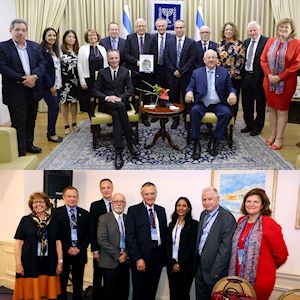From May 8–11, special events were held in Israel to honor a special issue in The Lancet on “Health in Israel.” The issue is the good fruit of a controversial 2014 initiative taken by Rambam HCC.
 The Editorial team of the Lancet (top) with
Reuven Rivlin, President of Israel, and
(bottom) in Tel Aviv.
Photograpy: Top) Pioter Fliter; Bottom) GPO.
The Editorial team of the Lancet (top) with
Reuven Rivlin, President of Israel, and
(bottom) in Tel Aviv.
Photograpy: Top) Pioter Fliter; Bottom) GPO.
The Lancet is one of the world’s leading medical and health journals as well as one of the oldest in publication. This month the journal published a special issue on the Healthcare System in Israel. The issue marks the closing of a circle: During the summer of 2014, in the midst of the Protective Edge operation, The Lancet published a letter to the editor entitled, “An Open Letter to the People of Gaza,” which criticized Israel’s policies and provoked intense debates in academia and medicine worldwide. At the height of the furor, Professor Karl Skorecki and Professor Rafi Beyar, the Director of Medical Research and Development and the Director and CEO, respectively, of Rambam Health Care Campus in Haifa, sent a special communication to Professor Richard Horton, Editor-in-Chief of The Lancet. They invited him to visit Israel to experience for himself the reality of Israel in general, and specifically Israel’s healthcare system. Professor A. Mark Clarfield of Ben Gurion University also joined this unique mission. The fruit of Horton’s visit to Israel was the launch of a special issue of The Lancet, “Heath in Israel,” on May 8 in Tel Aviv.
In addition to Tel Aviv, events surrounding the launch were held at Rambam Health Care Campus, Haifa; the English Hospital, Nazareth; Soroka Hospital, Beersheba; and a closing ceremony was held in the home of President Reuven Rivlin in Jerusalem.
The special issue is comprised of 12 articles, essays, or commentaries in total, as well as online only profiles—all written by or about Israeli health professionals and researchers regarding a variety of aspects of medicine and healthcare in Israel. Authors are primarily from three main institutes in Israel: Rambam Health Care Campus, Ben-Gurion University of the Negev, and the Israeli National Institute of Health Services Research and Health Policy; the chief editors for this special issue were Professor A. Mark Clarfield from Ben Gurion University, Professor Zaher Azzam, from Rambam, and Professor Aorli Manor of the National Institute for Health Policy.
Professor Richard Horton, the journal’s editor-in-chief, said: "This is a great opportunity to celebrate Israel's achievements throughout its 69 years of existence, and your commitment to universal access to healthcare.”
He continued, “We want to see Israel as a global society, extending international engagement and development cooperation with the rest of the world. This series and I personally utterly reject the boycott against Israel. Boycotts are no way to deal with difference of opinion. Boycotts entrench prejudice and hate, they perpetuate difference and we reject utterly that approach to discussing differences of opinion between communities and peoples.”
Rambam Health Care Campus is proud to have facilitated this historical publication, and to be part of an ongoing collaboration to bring Israel’s story to the world.
In the words of Professor Horton at a press conference in Tel Aviv, "The special issue on Israel will not be a one-time project. It is the beginning of a close partnership."

